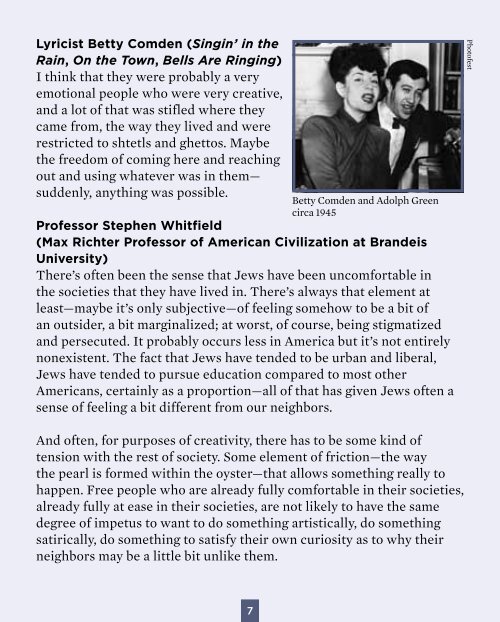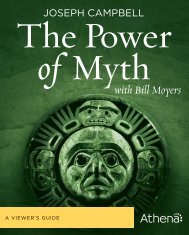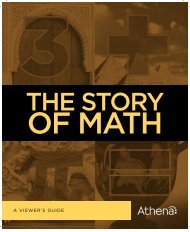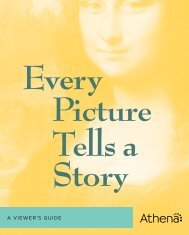Broadway Musicals - Athena
Broadway Musicals - Athena
Broadway Musicals - Athena
You also want an ePaper? Increase the reach of your titles
YUMPU automatically turns print PDFs into web optimized ePapers that Google loves.
Lyricist Betty Comden (Singin’ in the<br />
Rain, On the Town, Bells Are Ringing)<br />
I think that they were probably a very<br />
emotional people who were very creative,<br />
and a lot of that was stifled where they<br />
came from, the way they lived and were<br />
restricted to shtetls and ghettos. Maybe<br />
the freedom of coming here and reaching<br />
out and using whatever was in them—<br />
suddenly, anything was possible.<br />
Betty Comden and Adolph Green<br />
circa 1945<br />
Professor Stephen Whitfield<br />
(Max Richter Professor of American Civilization at Brandeis<br />
University)<br />
There’s often been the sense that Jews have been uncomfortable in<br />
the societies that they have lived in. There’s always that element at<br />
least—maybe it’s only subjective—of feeling somehow to be a bit of<br />
an outsider, a bit marginalized; at worst, of course, being stigmatized<br />
and persecuted. It probably occurs less in America but it’s not entirely<br />
nonexistent. The fact that Jews have tended to be urban and liberal,<br />
Jews have tended to pursue education compared to most other<br />
Americans, certainly as a proportion—all of that has given Jews often a<br />
sense of feeling a bit different from our neighbors.<br />
And often, for purposes of creativity, there has to be some kind of<br />
tension with the rest of society. Some element of friction—the way<br />
the pearl is formed within the oyster—that allows something really to<br />
happen. Free people who are already fully comfortable in their societies,<br />
already fully at ease in their societies, are not likely to have the same<br />
degree of impetus to want to do something artistically, do something<br />
satirically, do something to satisfy their own curiosity as to why their<br />
neighbors may be a little bit unlike them.<br />
Photofest<br />
Jamie Bernstein (daughter of Leonard Bernstein)<br />
My grandparents, Sam and Jennie Bernstein, were still very much<br />
around during my childhood. I used to love to go and stay in their house<br />
because it was kind of like suburbia, which was a thing that was not<br />
a part of my life at all. I grew up in New York City, and they had this<br />
sort of wonderful, very Jewish suburban neighborhood in Brookline,<br />
Massachusetts, that they were living in. Sam was very religious: he<br />
was fiercely passionate about the Talmud and the Torah, and he was<br />
studying all the time, and I think that was really the thing he cared<br />
about most in the world. He was not particularly passionate about his<br />
business although it was very successful, the Samuel J. Bernstein Hair<br />
Company in Boston. “It’s Bernstein!” was their slogan.<br />
So there was this sensibility in the house of this tremendous, fierce<br />
passion about Judaism. That was the environment that my father grew<br />
up in. He had his bar mitzvah and was pretty learned on his own about<br />
the Torah, and then he was expected to eventually run the Samuel J.<br />
Bernstein Hair Company.<br />
Sam was so proud to be able to offer his eldest son this fabulous<br />
business opportunity, so you can just imagine that it didn’t go well<br />
when my father expressed his desire to be a musician. “A musician? A<br />
klezmer?” Because in the old country, a musician meant being a kind of<br />
homeless guy who would schlep from village to village, shtetl to shtetl,<br />
with his fiddle. He would play a little bit and they’d throw him a few<br />
kopeks, give him a bowl of cabbage gruel, and send him on his way. “You<br />
call this a living?” Sam would have none of it, and the story goes that<br />
Sam refused to pay for my father’s piano lessons, because he didn’t want<br />
to encourage him in that direction.<br />
Then my father had his big overnight success, taking over at the<br />
last minute for Bruno Walter at Carnegie Hall, and it was broadcast<br />
nationally on the radio and he became sort of famous overnight. After<br />
7<br />
8















